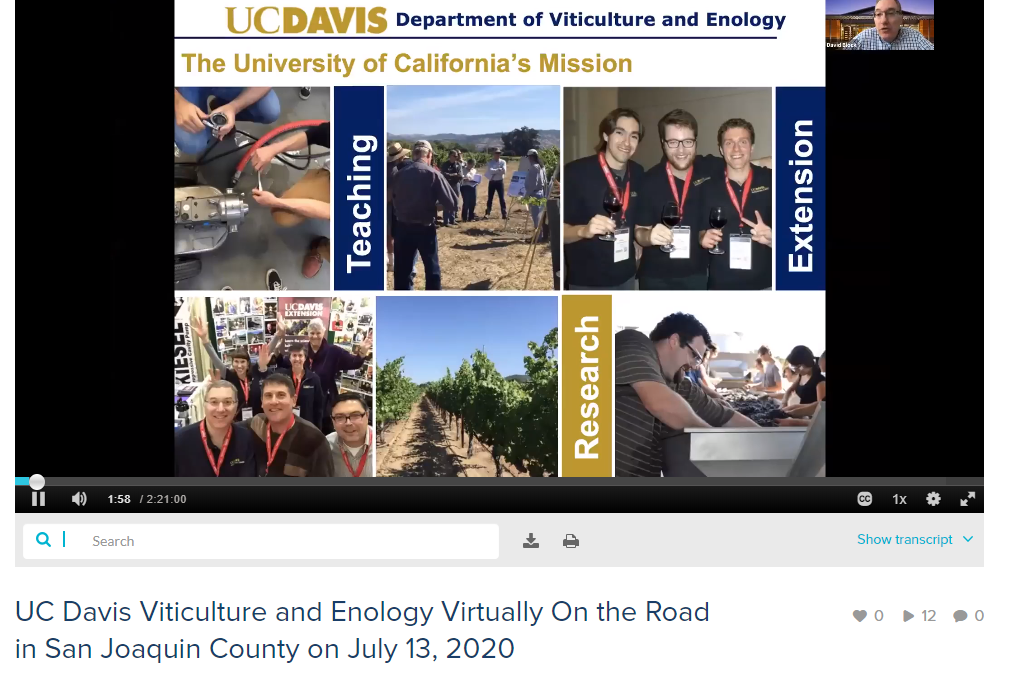AUGUST 24, 2020. BY UC DAVIS VITICULTURE & ENOLOGY DEPT.
Dr. Karen Block brought together several UC Davis professors to share highlights of their recent research with the Lodi winegrowing community on July 13, 2020. A video recording of their presentations is now available for you to watch here:
It was wonderful to connect with dedicated professors – including new faculty – and hear what they have been up to. The agenda included a nice mix of viticulture and enology topics, as follows:
-
-
-
- Department Update, David Block, Professor and Sands Department Chair, Department of Viticulture and Enology
- Evaluating traits to improve rootstock drought tolerance, Megan Bartlett, Assistant Professor, Department of Viticulture and Enology
- Artificial Intelligence, sensing, and automation, Mason Earles, Assistant Professor, Departments of Viticulture and Enology and Biological and Agricultural Engineering
- Irrigation and Heatwave Mitigation, Elisabeth Forrestel, Assistant Professor, Department of Viticulture and Enology
- Fermentation parameters and their effects on wine quality, Anita Oberholster, Cooperative Extension Specialist, Enology, Department of Viticulture and Enology
- Modeling fermentation parameters, David Block
- Identification of site-specific factors influencing Pinot noir fermentation outcomes, Ben Montpetit, Assistant Professor, Department of Viticulture and Enology
-
-
FACULTY BIOS:

David E. Block, Ph.D.
Position Title: Professor and Marvin Sands Department Chair
Unit: Viticulture and Enology
B.S., 1986, University of Pennsylvania, Ph.D., 1992, University of Minnesota
Since joining the Chemical Engineering faculty in 1996, Dr. David Block’s research has focused on wine fermentation technology and biopharmaceutical fermentation optimization based on historical process data and artificial intelligence. More recently, his work has included applications to biofuel production including the study of increased alcohol tolerance in microorganisms and of bio-based fuels. Dr. Block teaches “Biotech Facility Design and Regulatory Compliance,” “Wine Technology and Winery Systems,” and “Advances in the Science of Winemaking.” Before joining UC Davis, he worked in the Biopharmaceuticals Department at Hoffmann-La Roche in Nutley, New Jersey. At Roche, Block was in charge of a fermentation process development group and also a team leader for control systems in new manufacturing facilities. In the latter capacity, he helped to design, build, validate, and maintain multiple new facilities.
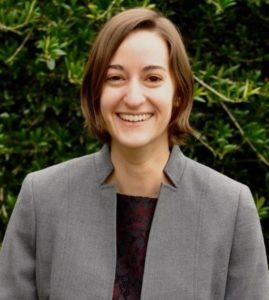
Megan Bartlett, Ph.D.
Position Title: Assistant Professor (Plant Biologist)
Unit: Viticulture and Enology
Dr. Megan Bartlett received her undergraduate degree in Organismal and Evolutionary Biology from Harvard University in 2009. She completed a Ph.D. in 2016 with Dr. Lawren Sack in the Department of Ecology and Evolutionary Biology at UCLA. Her Ph.D. work identified traits that are crucial to whole-plant drought tolerance, elucidated the cellular mechanism driving variation in these traits, and developed a new method to rapidly screen diverse plants for drought tolerance. Dr. Bartlett then completed her postdoctoral work with Dr. Stephen Pacala in the Department of Ecology and Evolutionary Biology at Princeton University. Since joining the V&E Department in Winter 2019, Dr. Bartlett’s research uses modeling and experimental approaches to address fundamental questions about the physiology traits and mechanisms that produce drought and heat tolerance.
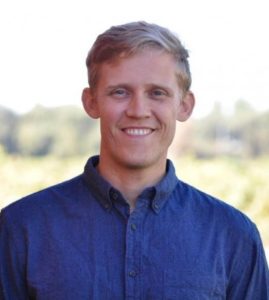
Mason Earles, Ph.D.
Position Title: Assistant Professor
Unit: Viticulture and Enology, Biological and Agricultural Engineering
Prior to joining UC Davis, Dr. Mason Earles worked as a Data Science Engineer at Apple where he created new deep learning and computer vision tools within hardware engineering. During his post-doctoral and doctoral work, he advanced new computational techniques for 3D image processing, quantification, and coupled biophysical modeling of plants. By combining these computational techniques with custom physiological and ecological instrumentation, he provided insight into organismal carbon dioxide diffusion and photosynthesis, water transport, and carbohydrate metabolism for species across the plant kingdom. As a faculty member in the Departments of Viticulture & Enology and Biological & Agricultural Engineering, Dr. Earles will build on this industry and academic experience to lead the Plant AI and Biophysics Lab.
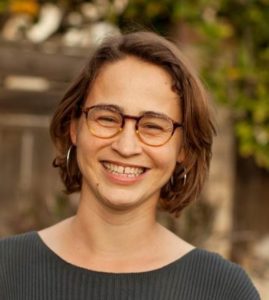
Elisabeth Forrestel, Ph.D.
Position Title: Assistant Professor
Unit: Viticulture and Enology
Committee Member, UC Davis Broadening Horizons Program
Dr. Elisabeth Forrestel completed her undergraduate degree in Biology at Cornell University in 2004 with a concentration in Molecular and Cell Biology. After forays into farming, wooden boat-building, and culinary pursuits, she completed a Ph.D. in 2015 at Yale University under the supervision of Dr. Michael Donoghue and Dr. Melinda Smith in the Department of Ecology and Evolutionary Biology. Dr. Forrestel went on to complete postdoctoral work with Dr. Elizabeth Wolkovich at the Arnold Arboretum of Harvard University, studying the phenological responses of winegrapes to a warming climate. As a National Science Foundation Postdoctoral Fellow, she came to the Department of Viticulture & Enology at UC Davis to study the phylogenetic and functional basis of drought and heat responses in wild and cultivated grapevine, under the mentorship of Dr. Andrew McElrone and Dr. Andrew Walker.
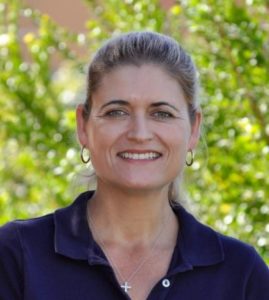
Anita Oberholster, Ph.D.
Position Title: Associate Specialist in Cooperative Extension in Enology
Unit: Viticulture and Enology
Ph.D. from Adelaide University in Australia
Dr. Anita Oberholster joined the department in April 2011 as a Cooperative Extension Specialist in Enology. During her Ph.D. studies, she was involved in the development of the mouthfeel wheel for red wine and investigated the changes in polymeric pigment structure and composition with wine aging. Dr. Oberholster’s research focuses on two main parts: firstly, the influence of both viticulture practices and environmental factors on grape ripening and composition and related wine quality. The emphasis is specifically on tannin and carotenoid biosynthesis. The second core research focus investigates the influence of vinification practices on wine composition and quality. This includes studies to determine the influences of various cap management techniques and the impact of oxygen (macro- and micro-oxygenation) and wood (barrel aging and oak alternatives) on wine aging and quality. Sustainability in both focus areas is important and ongoing studies include the use of new technologies, ‘green’ chemicals in the winery, and the re-use of winery wastewater for the irrigation of vines.
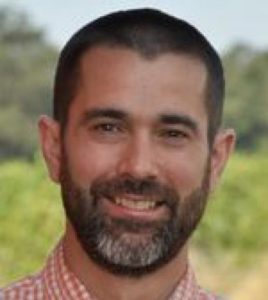
Ben Montpetit, Ph.D.
Position Title: Associate Professor (Yeast Biology)
Unit: Viticulture and Enology, Food Science and Technology
Ph.D., Biochemistry, University of British Columbia, Vancouver, Canada
Within Dr. Ben Montpetit’s laboratory, they investigate the mechanism and cellular machinery required to transport mRNA from the nucleus, where mRNA is made from a DNA template to the cytoplasm where it is used to direct the production of proteins. This process, termed mRNA export, is essential and can be used by the cell to regulate gene expression in response to environmental changes (e.g. cellular stress such as heat or ethanol). The key to mRNA export is the function of large protein assemblies, called nuclear pore complexes, which act as “gateways” between the nucleus and the rest of the cell. The research is performed using Saccharomyces cerevisiae due to the genetic, biochemical, and cell biological tools that are available, which in combination with the comprehensive knowledge about nuclear pore complex function, make budding yeast an extremely powerful model system. This knowledge is directly applicable to enology since changes in the environment (e.g. ethanol concentration) are known to perturb the mRNA export process. Conservation of the mRNA export machinery also makes the insights we gain from our studies relevant to humans where disruptions to mRNA export are associated with multiple human diseases and viral infection.
This extension work was brought to the Lodi winegrowing community thanks to the support of these sponsors:
Extension Program Gold Sponsors

Extension Program Bronze Sponsors

Have something interesting to say? Consider writing a guest blog article!
To subscribe to the Coffee Shop Blog, send an email to stephanie@lodiwine.com with the subject “blog subscribe.”
To join the Lodi Growers email list, send an email to stephanie@lodiwine.com with the subject “grower email subscribe.”
To receive Lodi Grower news and event promotions by mail, send your contact information to stephanie@lodiwine.com or call 209.367.4727.
For more information on the wines of Lodi, visit the Lodi Winegrape Commission’s consumer website, lodiwine.com.

